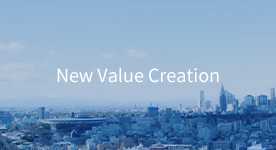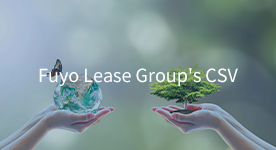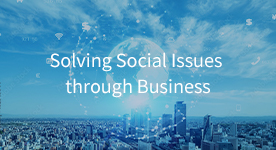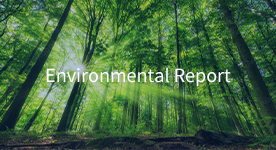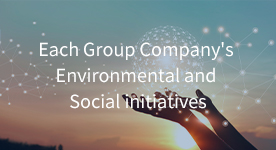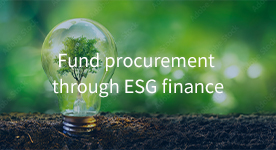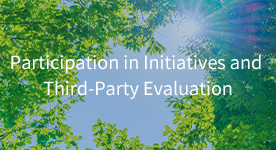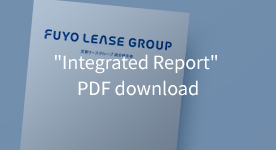Mission, Vision, Values and Value Creation Story
Materiality
We have identified key issues in the fields of "environment" and "society and people," which are keystones of the value creation process through CSV management, as well as important items related to "organizational and structural support for sustainable value creation" and "partnerships," as material matters.Non-financial KPI and targets for fiscal 2026, the final year of the medium-term management plan, have been set for each material matters, and we are moving forward to achieve these targets while monitoring their progress.
Furthermore, material issues are reviewed as necessary based on feedback from the Board of Directors, management members, and other stakeholders.
Identifying Materiality
-
STEP 1
Considering material matters
-
While drawing up the medium-term management plan, we specified the 2030 Vision of each business domain and, back casting from this, identified material matters where there are strong needs to create social value and business opportunities.
-
STEP 2
Discussions in each business unit and at management level
-
During discussions* on drawing up the medium-term management plan, we positioned non-financial issues with equal weighting to financial issues and discussed the suitability of each non-financial issue while taking into account a long-term strategy.
-
*Conducted through fiscal 2021, with outside directors participating in discussions multiple times.
-
-
STEP 3
Setting non-financial KPI
-
As KPIs to monitor the progress of each material matters, we have set appropriate indicators and goals in alignment with the Medium-Term Management Plan Fuyo Shared Value 2026.
-
STEP 4
Discussion and approval at the Board of Directors
-
Discussed by the Board of Directors and approved by the Board of Directors, taking into account the opinions of outside directors.
Materiality for Fuyo Lease Group
The Materiality identification process shown above identified eight material issues to be addressed through our new Medium-Term Management Plan Fuyo Shared Value 2026.
-
1.Contribution to the realization of a decarbonized society
-
2.Contribution to the realization of a circular society
-
3.Provide solutions that resolve customers' management issues to deliver reassurance through ensured health and welfare
-
4.Provide services that deliver new value creation time
-
5.Strategic human resources development
-
6.Diversity and inclusion
-
7.Health and productivity management, work-life balance
-
8.Value creation through partnerships
Targets and Results of Materiality
Environment
1.Contribution to the realization of a decarbonized society
| Non-Financial KPI | FY2024 Results | FY2026 Targets | SDGs being contributed to |
|---|---|---|---|
|
CO₂ emissions reduction contribution |
450,000t-CO₂/year |
500,000 t-CO₂ |



|
|
Amount invested in promoting decarbonization*2 |
¥255.8 billion |
Total of ¥300.0 billion over five years |
|
|
Renewable energy power generation capacity |
876MW*1 |
1,000MW |
|
|
Percentage of new contracts that are either EVs or FCVs(Fuyo Auto Lease and YAMATO LEASE) |
Changed target |
5% |
|
|
Amount of financing handled for the promotion of decarbonization*3 |
¥34.9 billion |
5-year cumulative total ¥ 15.0 billion |
2.Contributing to the realization of a circular society
| Non-Financial KPI | FY2024 Results | FY2026 Targets | SDGs being contributed to |
|---|---|---|---|
|
Percentage of returned items that are reused or recycled*4 |
100% |
100% |



|
|
Percentage of materials / chemicals contained in waste plastics (from returned items) that are recycled*4 |
77.5% |
100% |
Society and people
3.Delivery of reassurance by ensuring health and welfare
| Non-Financial KPI | FY2024 Results | FY2026 Targets | SDGs being contributed to |
|---|---|---|---|
|
Number of new rooms provided at elderly care homes |
1,011 rooms |
5-year cumulative total 1,330rooms |



|
|
Management support-related financing in medical and welfare markets*5 |
¥45.6 billion |
¥56.0 billion |
4.Creation of new value creation time
| Non-Financial KPI | FY2024 Results | FY2026 Targets | SDGs being contributed to |
|---|---|---|---|
|
Work hours saved by our customers |
+810,000 hours |
+1 million hours compared to FY2021 |



|
Organizational and structural support for sustainable value creation
5.Strategic human resources development
| Non-Financial KPI | FY2024 Results | FY2026 Targets | SDGs being contributed to |
|---|---|---|---|
|
Human resource development-related expenses (non-consolidated) |
337% |
300% compared to FY2021 |


|
| Cost per person*6 ¥287,932 |
6.Diversity and inclusion
| Non-Financial KPI | FY2024 Results | FY2026 Targets | SDGs being contributed to |
|---|---|---|---|
|
Percentage of women in managerial positions(non-consolidated)(non-consolidated) |
33.4% |
35% |


|
|
Percentage of eligible male employees who have taken childcare leave*7 (non-consolidated) |
100% |
100% |
7.Health and productivity management, work-life balance
| Non-Financial KPI | FY2024 Results | FY2026 Targets | SDGs being contributed to |
|---|---|---|---|
|
Percentage of employees aged 35 or over who have had a health examination (non-consolidated) |
100% |
100% |


|
|
Rate of taking annual paid leave (non-consolidated) |
92.8% |
90% |
|
|
Rate of taking the +Friday system (non-consolidated) |
90.8% |
No quantitative target |
|
|
Percentage of improvement in engagement indicators*8 (consolidated) |
3.46 |
No quantitative target |
Value creation through partnerships
8.Value creation through partnerships
| Non-Financial KPI | FY2024 Results | FY2026 Targets | SDGs being contributed to |
|---|---|---|---|
|
Investment in venture companies that have technologies and services that will create new social value |
Investment Record
|
No quantitative target |

|
-
*1Applies to investments and project financing, etc., made in the Renewable Energy Generation Business (power generation capacity is calculated based on ownership ratio or share).
-
*2Applies to investments in renewable energy facilities, energy-saving facilities, electric vehicles (including charging equipment), batteries, hydrogen and ammonia-related facilities, CO₂ separation and recovery technologies (CCUS, DAC), circular-related facilities, ZEB / Green buildings, SAF and start-up companies.
-
*3Covers the Fuyo 100% Renewable Electricity Declaration Support Program, the Fuyo Zero Carbon City Support Program and the Fuyo Circular Economy Lease
-
*4Applies to leased (rental) assets returned to the Hachioji Technical Center of FGL Circular Network Co., Ltd.
-
*5The balance of operating assets for financing related to FPS Medical (factoring for medical and nursing care receivables by Accretive) and business succession.
-
*6Human resource development-related expenses include training-related expenses (cost of conducting training, costs related to outside courses, etc.) and cost of incentives for self-development (costs related to the cafeteria plan and subsidies for obtaining certifications, etc.). They also include an estimate of expenses attributable to the fiscal year under review out of all expenses related to the training center located in Toyosu, newly established during the fiscal year under review (including lease rent, depreciation expenses for furniture and fixtures, construction and installation costs associated with the new establishment, etc.). Human resource development-related costs are divided by the average number of employees during the period under review (covering core employees, career-track employees, operations employees, temporary employees and contract employees who are eligible to receive cafeteria plan self-development points) to calculate the per-person human resource development-related cost.
-
*7Childcare leave taken percentage is calculated as the ratio of the number of employees who took childcare leave during the relevant fiscal year to the number of employees eligible for childcare leave during the relevant fiscal year (number of people who had a child within the fiscal year).
-
*8This is a measure of the average response value to eight items on an employee awareness survey, including job satisfaction, providing value to society, growth and others. Survey results cover 14 companies in Japan out of the Group's main companies.

![Mission We seek to achieve sustainable growth in partnerships between society and enterprises. [Creating Shared Value (CSV)] We deepen mutual trust with our customers by engaging closely with them to understand their needs and by providing high value-added services. Furthermore, we solve social issues that lie ahead by persisting with such efforts and continuing to create various forms of value with our customers (mutual trust and co-creation). We achieve this by supporting employee challenges and growth, who serve as the driving force of such initiatives by enabling high-quality solutions that address customer needs and further strengthening mutual trust with our customers. Realize by these three approaches as our Vision, we generate a virtuous cycle of value creation and achieve sustainable growth by simultaneously delivering economic value and social value. Our executives and employees share and implement our values, underpinned by our slogan of “Go Where No One Has Gone Before,” which increases the likelihood of achieving such ideals.](/eng/sustainability/about/images/materiality-img-12.png)
